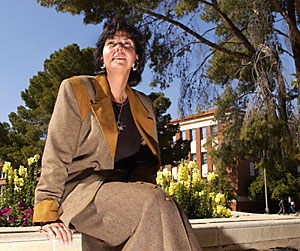 |
|
CHRIS CODUTO/Arizona Daily Wildcat
|
Michelle Grijalva, a professor in American Indian studies and English has been at the UA for nearly 15 years. She recently authored a memoir about growing up in Tucson as a mixed-blood woman.
|
|
|
By Andrew O'Neill
Arizona Daily Wildcat
Wednesday, March 9, 2005
Print this
She is haunted by her family's past.
Her life is intricately woven into the rich tapestry of Southern Arizona history, and she has spent nearly 15 years sharing her experiences with students.
Michelle Grijalva is a professor of English and American Indian studies at the UA, where she teaches courses that range from American Indian religion and spirituality to Native Americans in film.
American Indian studies is both a graduate program and a minor in the Graduate College.
"I think there's a real need for it in Arizona," Grijalva said, making reference to the several American Indian tribes in the Southwest.
She said American Indian studies is an interdisciplinary program encompassing a variety of subjects, such as education, law, public policy, language and literature.
"I think it gives Arizona a depth to its history," Grijalva said.
She now has an opportunity to share her own history with a wider audience.
Grijalva, who is of Pascua Yaqui, Welsh and Mexican descent, just completed a memoir about growing up in Tucson as a mixed-blood woman titled "Blood Memory." She said she hopes the book will be published by the UA Press later this year.
Grijalva said she forced herself to confront her family's "gruesome legacies" of curses, hatred and ghosts in the book. She said she also learned how to make peace with her past and writing has been a great catharsis for her.
Grijalva said her life story involves some of the darker aspects of Arizona history, such as a law prohibiting mixed-blood marriage. She said her parents and other mixed-blood couples had to find ways to circumvent the law, which was eventually repealed in 1962.
"I wanted to make sense of my heritage," Grijalva said. "It's nice to know I don't have to hide this stuff."
Grijalva spent the better part of her professional life doing just that.
She completed a bachelor of arts degree in philosophy at the UA, where she later earned her master's and doctorate degrees in English.
She said she makes connections among different literatures, such as Greek tragedies, Shakespeare and American Indian literature.
"I love stories. It was a natural field for me to go into," Grijalva said. "For me, ancient and contemporary voices really come together."
She said she enjoys having a career where she can combine her passions for teaching, writing and research.
Some of Grijalva's students said they were appreciative of her extensive background in English and American Indian studies.
"She's extremely knowledgeable and has an incredible memory," said Ashley Hillard, a media arts junior who is taking Grijalva's course on American Indian religion and spirituality.
Hillard said Grijalva brings her knowledge of other subjects to class discussion, which has been beneficial.
"It's opened up my mind to a lot of different religions and cultures," Hillard said.
Other students said they liked Grijalva's ability to push their boundaries of intellectual inquiry.
Grijalva said she hopes students realize the learning process is dynamic and ever-changing, and she wants them to be excited about her classes and to want to come each day.
She has learned to embrace her past, which she said is both "beautiful and gruesome."
Grijalva said over time, she ultimately realized the wisdom of a statement her mother frequently recited.
"There is nothing so bad that something good doesn't come from it."
